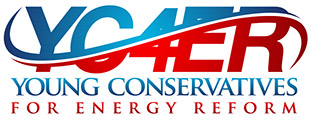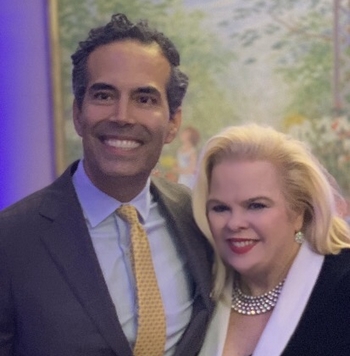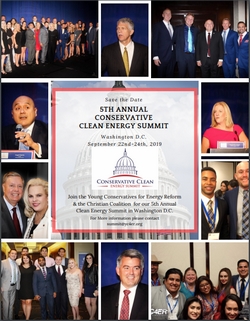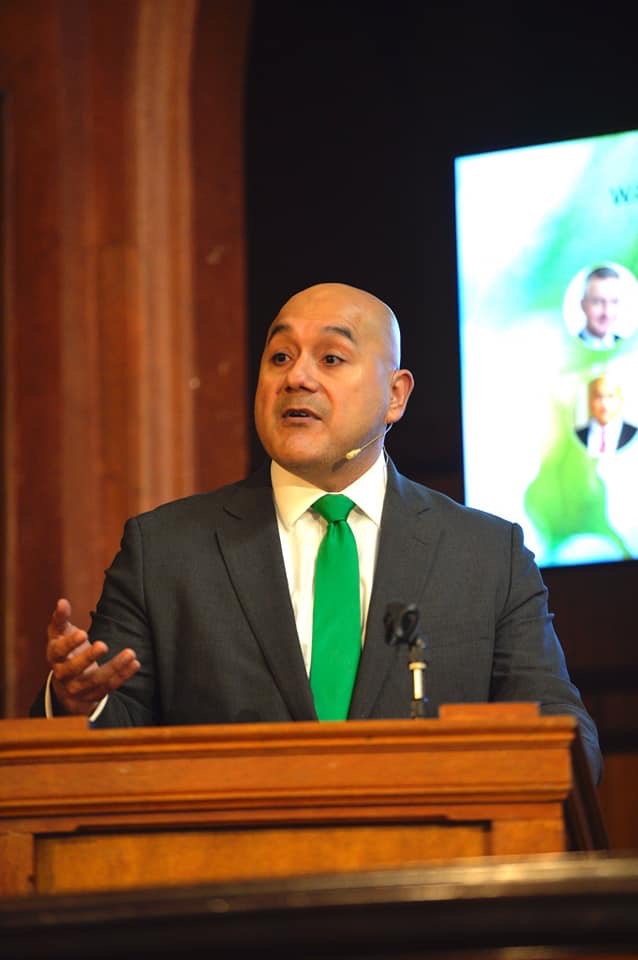 By Amanda Little
By Amanda Little
Just before Senator Chuck Grassley, of Iowa, took the stage at last week’s Conservative Clean Energy Summit, the event’s three hundred or so attendees were on their feet, pressing their hands to their hearts. They had sung along to a medley of anthems—“The Star-Spangled Banner,” “God Bless America,” “The Battle Hymn of the Republic,” the country-music chart-topper “Proud to Be an American”—as the conference room at the Capitol Hill Hyatt Regency was bathed in a splashy light show of stars and stripes. “It’s a privilege for me to be with people who believe that Jesus Christ is their personal savior and who are politically conservative,” Grassley said, “And it’s a privilege to get to speak to you about the virtues of a strong energy policy.” That rhetorical jump might have sounded abrupt to a passerby, but to the crowd it made perfect sense.
The summit was organized and hosted by Michele Combs, who heads up the group Young Conservatives for Energy Reform (Y.C.E.R.), and her mother, Roberta Combs, the president and C.E.O. of the Christian Coalition of America. Whereas Roberta has been a major player in the anti-abortion movement and has lobbied for the appointment of conservative Supreme Court justices, Michele is staking her career on a notably different cause. “Clean energy is not a Democrat issue. It’s a family issue,” she told me. “It’s about freedom and health and jobs and conserving our environment. It brings everybody together. Al Gore and I go way back—he’s a good friend—but he’s polarizing. He can’t get this message to our constituency.” The summit was part of an ongoing effort to move the issues of climate change and clean energy from the margins of the Republican Party to its mainstream. Although the Combses scarcely spoke at the event, they chose others to make their case—the executive of a solar-power company, a three-star and a four-star general, two congressman, and six U.S. senators.
Most of the summit’s audience appeared to range in age from eighteen to forty-five. Students and professionals had been flown and bussed in from around the country; there were representatives of the Christian Coalition, the Young Republican National Federation, and the thirty-one state chapters of Y.C.E.R. The stated goal of the event was simply to educate, but given how much collective political heat the speakers were packing it seemed clear that bigger questions were at play—questions about the future of a fractured G.O.P. “It is now time for the conservative cause to embrace energy reform and a clean environment,” Senator Lindsey Graham, of South Carolina, said via video link from the Presidential campaign trail. “Let’s not turn this over to the most liberal people in the country.” Clean energy, he added, is “the cause of a lifetime.”
There was an impressive amount of Republican self-critique among some of the speakers. Grassley, for instance, called out his colleagues for favoring fossil fuels over alternative energy. “You are going to find people in this town who say they are for ‘all of the above’ energy, but they’re really for none of the above and all of the below,” he said, underscoring his support for aboveground wind and solar resources. He and other speakers acknowledged that, from a consumer standpoint, belowground energy sources—oil and natural gas, in particular—are cheaper and more accessible now than they have been in years. Even more notable, however, are the trends in the renewable-energy marketplace: fossil-fuel prices fluctuate, but the costs associated with solar and wind power have been declining and will likely continue to fall. Indeed, nearly every speech was crammed with feel-good economic statistics: solar has become eighty per cent cheaper in the past five years; the U.S. clean-energy sector grew fourteen per cent in 2014, about five times as much as the rest of the economy. Senator Richard Burr, of North Carolina, cut to the chase. “Let me sum it up in one word: jobs,” he said.
Many of the speakers dodged both the issue of climate change and the pervasive conservative argument that fighting it will destroy, not create, jobs. Some of the most visible Republicans on the national stage, including the Senate Majority Leader Mitch McConnell and several Presidential contenders—Donald Trump, Ben Carson, and Marco Rubio—have made this argument before. (Trump, in a tweet, deemed climate science “bullshit.”) Rather than uttering the dreaded phrase, Senator John McCain, a former champion of climate legislation, spoke to the summit crowd about national security. Jeremy Symons, the director of climate and political affairs at the Environmental Defense Fund, advocated a big-tent approach. “It doesn’t matter whether you’re motivated by American energy independence, or by the promise of a clean-energy economy, or by breaking the power of monopolies over our home-energy choices, or by cleaner air, or by climate change,” he said. “What’s important is that you’re here.”
The long-term goal of Y.C.E.R., Michele Combs told me, is to help get “a comprehensive energy-reform bill” passed in the Senate soon after the next administration takes office—a bill that could also, in effect, break the congressional climate-legislation stalemate. No major Republican-backed climate or energy legislation has been proposed in the Senate since a cap-and-trade bill that Graham supported failed, back in 2010. (The Combses helped persuade Graham to take a leadership role on that bill, and they threw the support of the Christian Coalition behind it.) “We’re building grassroots to provide cover—to keep senators politically safe when they support energy reform,” Combs said. “First, we’re establishing common ground and a new terminology. Terms like ‘energy reform’ will bring a lot more conservatives to the table than ‘climate change.’ ”
If national polls are any indication, this is the time. A recent study from the University of Texas at Austin showed that fifty-nine per cent of Republican voters now accept climate science, up from forty-seven per cent just six months ago. A separate study from the University of Michigan showed similar results: fifty-six per cent of Republican respondents said that they believe global warming is a real and immediate concern, up from forty-seven per cent a year ago. The shift may have been driven, at least in part, by growing concerns about extreme weather phenomena—the withering drought in California, for example. “It’s getting harder to ignore nature,” Keith den Hollander, the thirty-eight-year-old chairman of the Christian Coalition of Michigan, told me. “Do I think that our climate’s changing? Yeah, I do. I mean, I’ve seen more severe winters than in the past, definitely some strange weather patterns.
It’s too early to know what measures a comprehensive, Republican-backed energy-reform bill might contain—and whether they would satisfy Democrats. Partisan conflict on this issue continues to smolder. Right now, twenty-six states are suing President Obama for his recent effort to regulate carbon-dioxide emissions under the Clean Air Act. But a growing number of conservative congressional leaders are trying to stake a claim on the climate issue. Yesterday, Graham and a group of his colleagues—Kelly Ayotte, of New Hampshire; Mark Kirk, of Illinois; and Lamar Alexander, of Tennessee—announced the formation of a Senate Energy and Environmental Working Group. Last month, eleven Republicans in the House introduced a resolution to address “the causes and effects of climate change.” It’s progress, albeit slow.
But is there time to wait for Republican leaders to inch their way toward climate legislation? A critical environmentalist might argue that an event like the Conservative Clean Energy Summit can’t establish a framework for carbon-emission reductions that are big enough and fast enough to keep warming below two degrees Celsius and stave off the worst impacts of climate change. Roberta Combs counters that such impatience inevitably backfires. “The liberals want to do it all at once—they want to solve this issue in one fell swoop,” she said. “That’s why they can’t get anything done. In reality, it has to be bit by bit. You have to bite the elephant one piece at a time, because it’s too big to swallow whole.”
http://www.newyorker.com/tech/elements/will-conservatives-finally-embrace-clean-energy









